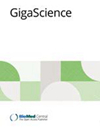投稿信息
稿件收录要求
GigaScience aims to revolutionize publishing by promoting reproducibility of analyses and data dissemination, organization, understanding, and use. As an open access and open-data journal, we publish ALL research objects (data, software tools and workflows) from ''big data'' studies across the entire spectrum of life and biomedical sciences. These resources are managed using the FAIR Principles for scientific data management and stewardship that state that research data should be Findable, Accessible, Interoperable and Reusable.
To achieve our goals, the journal has a novel publication format: one that links standard manuscript publication with an extensive database that hosts all associated data and provides data analysis tools and cloud-computing resources. GigaDB provides a direct link between the published manuscript and the relevant supporting data. We have also built GigaGalaxy, a Galaxy-based data analysis platform to host computational methods and workflows, maximizing use of the data, tools and workflows in our papers in a more accessible and reproducible environment.
Our scope covers not just ''omic'' type data and the fields of high-throughput biology currently serviced by large public repositories, but also the growing range of more difficult-to-access data, such as imaging, neuroscience, ecology, cohort data, systems biology and other new types of large-scale sharable data.
Open Access and Open Data for Open Science
All articles and content (including blogs and peer reviews) published by GigaScience are made freely and permanently accessible online immediately upon publication, without subscription charges or registration barriers. All software is published under Open Source Initiative (OSI)-approved open source licences, and supporting data presented under a public domain CC0 waiver. Further information about our open access policies and our article processing charges to support these efforts can be found here.
Our Principles
Built upon the principles of open and FAIR data, reproducibility, usability and utility are our key criteria for publication rather than subjective assessments of impact. Key to achieving this is our open, integrated and custom built GigaDB repository that can help provide a home to all research objects. Open and citable data and metadata are key to reproducible research. Reproducibility is further enhanced via integration with protocol and computational workflow repositories and platforms. Making the research cycle more transparent and open, GigaScience encourages pre-publication discussion and faster scientific communication through integration with the bioRxiv pre-print server and the Publons platform to credit reviewers with citable DOIs.
%20(2).jpg)
Indexing
All articles published in GigaScience are included in:
- DOAJ
- MEDLINE
- PubMed
- PubMed Central
- Science Citation Index Expanded
- Scopus
- Google Scholar
We feel that the way Impact Factor (IF) is currently used — as a measure of the quality of work a researcher does (sometimes exclusively)— does not properly promote best practices in science (such as early sharing, time spent training and educating junior researchers, collaborations, and more). We have signed The San Francisco Declaration on Research Assessment (DORA) declaration and refuse to use it as as a promotional tool. Note: we do recognize that for some researchers, IF is very important for deciding where they can publish: for those individuals, please do an online search to obtain our IF.




